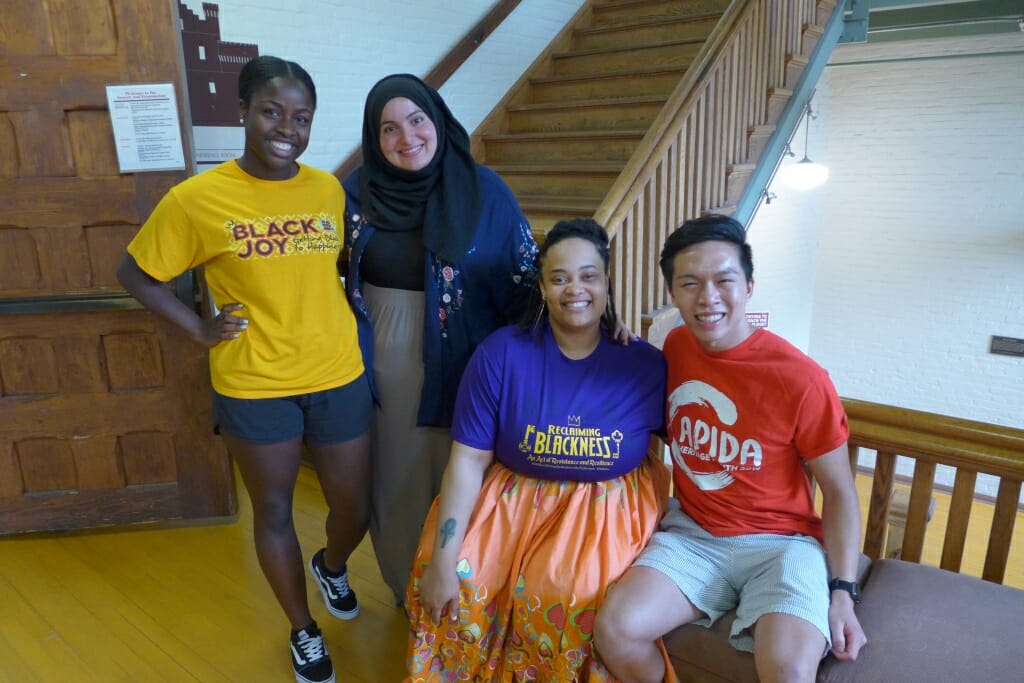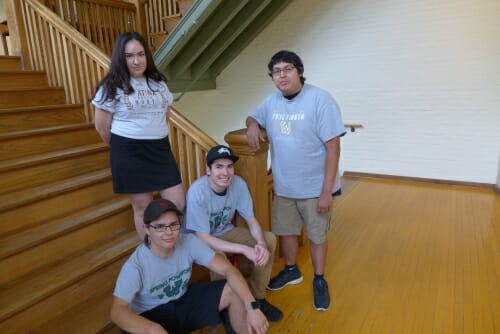Five cultural heritage month celebrations will bring special programming, dozens of events to campus

Among the UW–Madison students helping to plan cultural heritage month celebrations are, from left, Kingsley Pissang (Black History Month), Mouna Algahaithi (MENA Heritage Month), Breanna Taylor (Black History Month) and Riley Tsang (APIDA Heritage Month). Photo by Doug Erickson
UW–Madison will celebrate five cultural heritage months during the 2018-19 academic year, observances packed with special events honoring the achievements and histories of communities of color.
The events are organized almost entirely by students, who devote months to their planning.
“When I think about my culture and my ethnicity, this work is very important to me,” says Michelle Navarro, a junior from Chicago. “There’s so much beauty in being able to create programming that’s meaningful.”

Michelle Navarro is helping to plan events for Latinx Heritage Month, while fellow students, from left, Michael Williams, Collin Ludwig and Michael Gilpin are helping to organize the Native November celebration. Photo by Doug Erickson
Navarro is co-chair of the student planning committee for Latinx Heritage Month, the first of the celebrations. It straddles two months, running Sept. 15-Oct. 15. A calendar of specific events can be found here. Latinx Heritage Month will be followed by:
- November: Native November, honoring Native Americans
- February: Black History Month
- March: Middle Eastern North African (MENA) Heritage Month
- April: Asian Pacific Islander Desi American (APIDA) Heritage Month
Events range from concerts and prominent guest speakers to small group discussions and activity fairs.
Staff members of the Multicultural Student Center (MSC), part of the Division of Student Life, assist students in their planning. Karla Foster, MSC assistant director of cultural programming, directly oversees the student planning committees. The Division of Diversity, Equity & Educational Achievement (DDEEA) is an important co-sponsor and collaborator, providing funding and other support.
“So often, people think of the work of the MSC as food, festivals and fun, but it goes so much deeper than that,” says Assistant Dean and MSC Director Gabe Javier. “The heritage month events really showcase the breadth and richness of the programming on campus.”
While the events support members of individual cultural communities, they also serve an educational and outreach purpose to the broader campus community. It’s a sometimes tricky balance. Sophomore Michael Williams, a member of the Oneida Nation, is helping to plan events for Native November as a co-president of Wunk Sheek, a Native American student organization.
“As much as we love just being at these events ourselves, we also want there to be a teaching element to them,” says Williams, of Oneida, Wisconsin. “We want to make sure that people who don’t identify as Native can come and engage.”
That said, “I think it’s also important to note that it’s not our job to try to sell our events or our cultures to others,” says junior Kingsley Pissang, of Detroit, co-chair of the Black History Month planning committee. “Although teaching is one aspect, these months are set aside so that we can celebrate our cultures and our ancestors. That will always be the priority. If others want to join us, that’s great.”
Riley Tsang, co-chair of the planning committee for APIDA Heritage Month, calls the concept of cultural heritage months “really revolutionary.”
“A lot of the discussions at this university revolve around how we, as students of color, can survive on a predominantly white campus,” says Tsang, a senior from Brookfield, Wisconsin. “But during a cultural heritage month, we take what is often used to oppress us and turn it into a celebration of what makes our communities special and beautiful.”
Students typically spend three to six months planning each month of events.
“We do it because we believe it’s important for students to feel connected to their cultures and to each other,” says senior Mouna Algahaithi, of Tampa, Florida, chair of the MENA Heritage Month planning committee. “If we are not going to be representatives of our own ethnic and cultural groups, then who is?”
Students interested in helping to plan cultural heritage month events or volunteer at them can email the Multicultural Student Center at msc@studentlife.wisc.edu. Students specifically interested in helping with Black History Month can email the Black Cultural Center at bcc@studentlife.wisc.edu. Wunk Sheek can be reached at wunksheekuw@gmail.com.
“I want to send a special word of thanks and gratitude to all of the past and present heritage month chairs, co-chairs and committee members,” Foster says. “Your work on this campus has been and remains radical, resilient and transformative. And to the many campus partners who’ve assisted and participated in these celebrations over the years, you are very much appreciated.”



